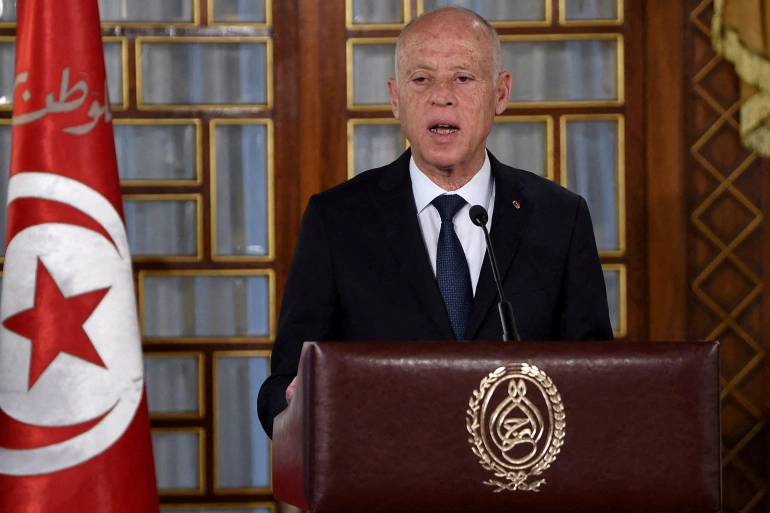
In separate letters, legislators and advocacy groups ask the administration of US President Joe Biden to do more to protect Tunisian democracy.
Lawmakers and rights groups in the United States are calling on the Biden administration to pressure Tunisian President Kais Saied to stop what they describe as the North African country’s “democratic backsliding”.
In a letter addressed to the top members of the US House of Representatives panel that allocates funds to the Department of State, US legislators have urged Washington to condition parts of the US’s security assistance package to Tunis.
The letter, a draft of which was shared with Al Jazeera, had garnered 12 signatures from House members by Tuesday morning, including Tom Malinowski, who helped lead the effort, Joe Wilson, Adam Schiff, Ro Khanna, Rashida Tlaib and Ilhan Omar.
“President Kais Saied’s power grab since July 25, 2021 threatens to derail this democratic transition and could usher in another dictatorship in the region or a period of increased unrest and instability,” the letter reads.
“The US position has remained relatively muted as Saied has consolidated control over the executive, legislative, and judicial branches and cracked down on dissent.”
This is the latest push by US legislators to get the administration of President Joe Biden to do more to protect democracy in Tunisia. It comes as the State Department takes its 2023 budget request to Congress, which holds the authority to allocate funds for the executive branch.
The document calls for that State Department funding bill to include language requiring the Biden administration to withhold portions of US security assistance to Tunisia “until and unless” Saied’s government meets human rights standards.
That includes ending the prosecution of journalists and politicians in military courts, removing military personnel blocking the Tunisian parliament building, and ceasing the “repression of fundamental rights of civilians and political and media figures”.
Elected in 2019, Saied froze the Tunisian parliament last year and subsequently dissolved it in March to rule by decree.
While critics decried the moves as a “coup” that risked bringing the country back to the authoritarianism of the pre-2011 uprisings that toppled longtime Tunisian leader Zine El Abidine Ben Ali, Saied and his supporters say his actions are necessary “reforms” aimed at fighting corruption.
Last week, Saied also seized control of Tunisia’s electoral commission and restructured it in a decree that raised fresh concerns about the integrity of future elections, including a July referendum on a new constitution.
On Tuesday, the US State Department said it was “deeply concerned” about the decision.
“A genuinely independent election authority is critical, given its constitutionally mandated role in Tunisia’s upcoming referendum and parliamentary elections,” spokesperson Ned Price told reporters.
“The United States has consistently communicated to Tunisian leaders the importance of upholding the independence of key democratic institutions and ensuring Tunisia returns to democratic governance.”
The Tunisian embassy in Washington, DC did not immediately respond to Al Jazeera’s request for comment on Wednesday afternoon.
On Tuesday, 50 US rights groups and Muslim-American organisations sent a letter to Secretary of State Antony Blinken calling on the Biden administration to use its leverage to pressure Saied to “restore democratic order” in Tunisia.
“Tunisians have made hard-won gains over the subsequent decade to establish a long-sought democracy, even as other post-Arab Spring states backslid into dictatorial rule or descended into civil war,” said the letter, which was signed by Democracy for the Arab World Now (DAWN), the Council on American-Islamic Relations (CAIR) and American Muslims for Palestine, among others.
“But now Tunisia’s delicate democratic experiment is being rapidly reversed after a blatant power grab by its autocratic president Kais Saied.”
The groups said the Biden administration should “match its rhetoric” with action by conditioning aid to the North African country. “We call on the Biden administration to suspend US military assistance until Tunisia is on a path towards democracy,” they said.
The letter also urged Washington to halt $500m in development grants that “requires Tunisia to meet democratic thresholds, until this same condition is met”.
Tunisia has long been seen as the sole success story of the Arab Spring – the 2011 uprisings against autocratic rule that swept across several countries in the Middle East and North Africa.
US aid to Tunisia, including security assistance, rose significantly after the country’s 2011 uprising and the US designated Tunisia as a major non-NATO ally in 2015, cementing the partnerships between the two countries.
But Biden’s proposed budget for 2023, which was released in late March, calls for slashing security assistance for Tunisia to around $61m, down from $121m last year, the Al-Monitor news website first reported earlier this month.
The Biden administration has repeatedly expressed “concern” about Saied’s conduct.
“We have consistently communicated to Tunisian officials that any political reform process should be transparent and inclusive, and undertaken in coordination with a range of political parties, labour unions, and civil society,” the State Department’s Price said after the Tunisian parliament was dissolved last month.
“A swift return to constitutional governance including an elected parliament is critical to democratic governance, and will ensure widespread and lasting support for needed reforms to help Tunisia’s economy rebound.”

WORLD OPINIONS BY AL JAZEERA




 World Opinion | Alternative Média زوايا ميادين | صوت من لا صوت له Débats De Société, Questions, Opinions et Tribunes.. La Voix Des Sans-Voix | Alternative Média
World Opinion | Alternative Média زوايا ميادين | صوت من لا صوت له Débats De Société, Questions, Opinions et Tribunes.. La Voix Des Sans-Voix | Alternative Média




